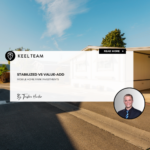The Pros and Cons of Different Real Estate Investment Types
-
 Tristan Hunter - Investor Relations
Tristan Hunter - Investor Relations
Investing in real estate is a popular method for potentially building wealth and generating passive income. However, with various types of real estate investments available, it’s important to understand the advantages and disadvantages of each. In this article, we will explore different real estate investment types, including residential properties, commercial properties, real estate investment trusts (REITs), and mobile home parks. By examining the pros and cons of each, you can make more informed decisions about where to possibly invest your money.

Residential Properties
Pros of Residential Real Estate Investment
Steady Income: Residential properties, particularly rental properties, may provide a steady stream of rental income. This can be appealing for investors looking for potentially regular cash flow.
Appreciation Potential: Over time, residential properties tend to appreciate in value. This long-term growth can significantly increase your investment’s worth.
Tax Benefits: Investing in residential properties may come with various tax benefits, including deductions for mortgage interest, property taxes, and depreciation.
Cons of Residential Real Estate Investment
Management and Maintenance: Owning rental properties requires active management. This includes finding and screening tenants, collecting rent, and handling maintenance issues. Hiring a property management company can alleviate some of this burden but adds to the cost.
Tenant Risks: Dealing with problematic tenants can be challenging. Late payments, property damage, and evictions are potential risks that can affect your income.
Market Fluctuations: The real estate market can be volatile. Economic downturns, changes in local markets, and housing crises can impact property values and rental income.
Looking for more information? Download our FREE eBook on “10 Things to Review When Considering a Passive Mobile Home Park Investment“
By Andrew Keel
Commercial Properties
Pros of Commercial Real Estate Investment
Higher Income Potential: Commercial properties often offer higher rental income compared to residential properties. Businesses typically pay more for commercial space, which could result in greater returns.
Longer Lease Terms: Commercial leases tend to be longer, potentially providing more stability and predictability in income. This can be particularly advantageous during economic fluctuations.
Triple Net Leases: Many commercial leases are triple net leases, meaning tenants are responsible for property taxes, insurance, and maintenance. This often reduces the investor’s expenses and management responsibilities.
Cons of Commercial Real Estate Investment
Higher Costs: Investing in commercial properties usually requires a significant upfront investment. The costs of purchasing and maintaining commercial real estate are typically higher compared to residential properties.
Complexity: Managing commercial properties can be more complex. It involves understanding business needs, negotiating leases, and maintaining larger properties.
Economic Sensitivity: Commercial properties are generally more sensitive to economic conditions. During economic downturns, businesses may downsize or close, leading to higher vacancy rates and lower rental income.
Mobile Home Parks
Mobile home parks are categorized under commercial property. Here are some typical pros and cons associated:
Pros of Mobile Home Park Investment
High Demand: Mobile home parks offer affordable housing options, which are in high demand, especially during economic downturns. This steady demand can lead to consistent occupancy rates and reliable income.
Low Maintenance Costs: In many cases, tenants own their mobile homes and are responsible for their maintenance. The trailer park owner is usually only responsible for maintaining common areas and infrastructure, reducing overall maintenance costs.
High Return on Investment: Mobile home parks can offer a high return on investment (ROI) due to lower acquisition costs and higher rental yields compared to other property types.
Options for Passive Investment: A lot of mobile home park operators raise capital for deals through syndications or funds, whereby a group of investors pool money together to acquire a mobile home park. This approach can be purely passive, without the need for your day-to-day management.
Cons of Mobile Home Park Investment
Stigma and Zoning Issues: Mobile home parks often face stigma and resistance from local communities and zoning boards. This can make it challenging to expand or develop new mobile home parks.
Management Challenges: While maintenance costs may be lower, managing a mobile home park still requires dealing with tenant issues and maintaining infrastructure. Effective management is crucial for potential long-term success.
Financing Difficulties: Securing financing for mobile home parks can be more challenging than for traditional real estate. Lenders may view them as higher risk, leading to stricter lending criteria and higher interest rates.

Real Estate Investment Trusts (REITs)
Pros of REITs
Liquidity: REITs are traded on major stock exchanges, making them more liquid than physical real estate. Investors can typically buy and sell shares easily, similar to stocks.
Diversification: Investing in REITs allows for diversification across different types of real estate and geographic locations. This can reduce risk and improve portfolio stability.
Passive Income: REITs generally provide a passive income stream through dividends. They are required to pay out at least 90% of their taxable income to shareholders, likely offering consistent returns.
Cons of REITs
Market Volatility: REITs are subject to stock market fluctuations. Their value can be affected by market sentiment and economic conditions, leading to potential volatility.
Management Fees: REITs charge management fees and administrative costs, which can eat into potential profits. It’s important to consider these fees when evaluating potential returns.
Limited Control: As a REIT investor, you have no control over property management or investment decisions. This lack of control may be a drawback for those who prefer hands-on involvement.

Conclusion
Real estate investment offers various opportunities to potentially build wealth and generate income. Each type of investment—residential properties, commercial properties, REITs, and mobile home parks—comes with its own set of pros and cons. Understanding these can help you choose the right investment strategy based on your financial goals, risk tolerance, and management preferences. Whether you seek steady rental income, higher returns, or a more passive investment, there is likely a real estate investment type that can align with your objectives. As always, thorough research and due diligence are essential before making any investment decisions.
Submit your details below and get in touch with Keel Team. Learn more about investing in mobile home parks and how to get started.
Learn more about mobile home park investing.
Interested in learning more about mobile home park investing? Get in touch with us today to find out more.
Disclaimer:
The information provided is for informational purposes only and is not investment advice or a guarantee of any kind. We do not guarantee profitability. Make investment decisions based on your own research and consult registered financial and legal professionals. We are not registered financial or legal professionals and do not provide personalized investment recommendations.

Tristan Hunter - Investor Relations
View The Previous or Next Post
Subscribe Below 👇





